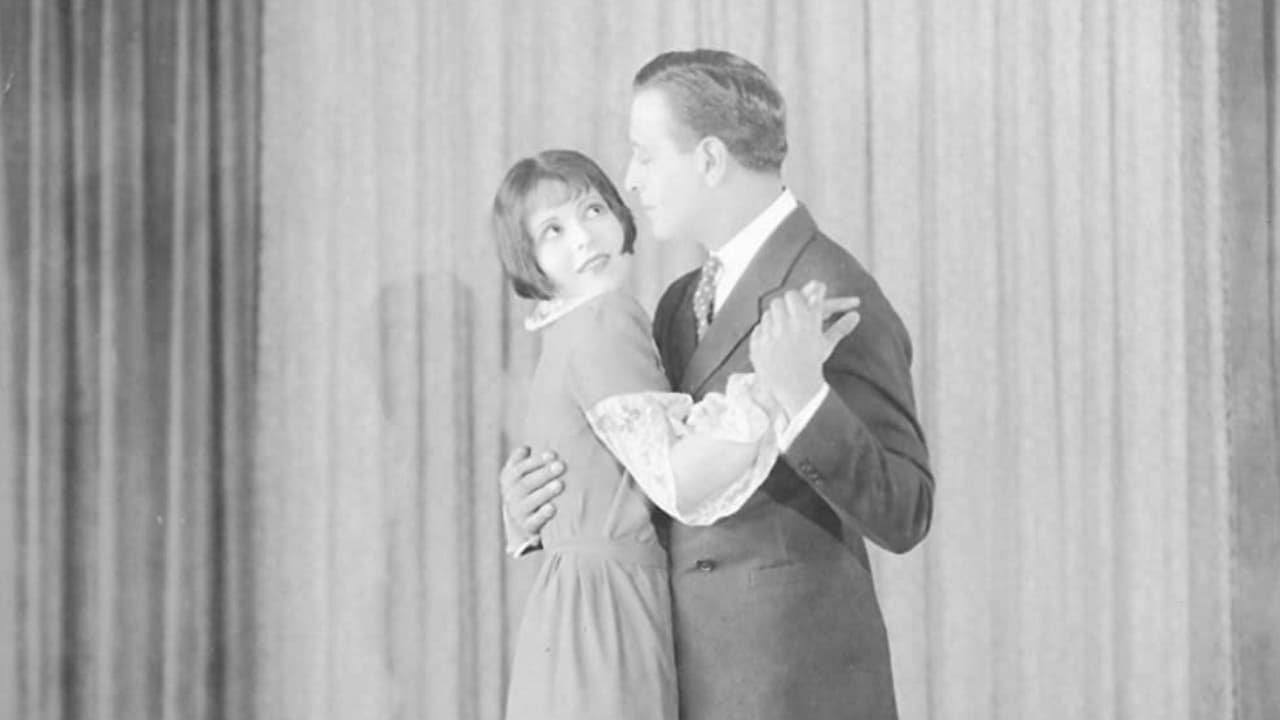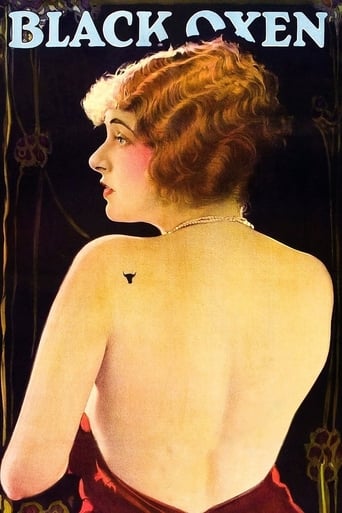

That's what one of Clara Bow's friends said about her performance in "Black Oxen" - the first time she experienced working with a top studio, big budget and a famous star. Schulberg recommended her to director Frank Lloyd and once he saw her knew she would be so right for the flapper role. Clara had her hew own take on the meeting - "he didn't make me feel like he was doin' me a favour lettin' me work in his picture". This was the movie that really got Clara noticed by the other studios. First National was so impressed with her performance that they requested her for "Painted People" another "biggie" with Colleen Moore but that turned out to be a fiasco. Clara's instinctive knowledge of what was right for her made her realise that the part was all wrong - "and she was right" Colleen Moore said. Still "Black Oxen" raised her standing and had her Preferred Studio bosses quadruple her salary to a princely $200 a week.This film is fascinating for what's not included. The film I saw was 60 minutes but it is supposed to be 80 minutes and because it flowed pretty smoothly I have to assume that the missing reels are at the end. And also for the fact that Claire MacDowall has a prominent supporting role as Agnes Trevor, an embittered spinster - in the film I saw she has a very small scene where she renounces Mary (Corinne Griffith) as a "Hypocrite"!!!When attractive "mystery woman" (Griffith) stands up at a Broadway first night, Lee Clavering's (Conway Tearle) elderly companion does a double take - she looks the mirror image of a girl, Mary Ogden, he was infatuated with in his youth but the last time he saw her she was old and feeble. Lee is determined to find out who she is - so they visit Jane Oglethorpe, a society "Grand Dame" who is feared for her frankness. Clara Bow is introduced as Janet Oglethorpe "going to Hell as fast as she can foxtrot - the wretched little flapper"!!! And from her first entrance she owns the movie - Lee exclaims "when you were little I gave you a spanking, I may be forced to do so again" - her reply "Can I depend on that"!!! Naughty Clara!! He also says when he has to escort her home and put up with her outrageous flirting "Girls of your age bore me to death and you're the silliest of them all"!!!Meanwhile Lee becomes involved with mystery woman Mary who finally reveals to him the secret of her youthful appearance. The victim of an early unhappy marriage that took her to Vienna, she finally found a reason for living through helping her adoptive country until age caught up with her. It is here that the make-up artists really have a chance to "go to town" on Miss Griffith but I agree with the other reviewers, she is made to seem old and decrepit and almost on her last legs at 60!! Offered a rejuvenating X-Ray anti aging treatment, she took it - not for vanity but because her feebleness was an impediment to her good works.She then announces it at Mrs. Oglethorpe's afternoon tea and later on Agnes Trevor speaks for them all when she wonders if she could regain her youth so she could find a husband. When Mary claims her ideals were higher than that Agnes denounces her - and Mary believes deep down that she is right!! Ian vehemently proclaims he would love her however old she looked but he is distinctly uncomfortable when some of the younger women "rib" her around the dinner table.The film finishes there but was definitely heading "somewhere" and it is fascinating to wonder what the ending would be like. I don't think in 1924 there was a mainstream Hollywood film that would take a chance to end on a controversial note. Since Mary proclaimed her secret she is very thoughtful about how she would be treated if she wasn't so young and beautiful. Meanwhile Janet has been reading "Flaming Youth"(another Colleen Moore film!!) and wondering how to get her man!! The flapper segments give the film a much needed zest - the love story between Griffith and Tearle being just a tad boring. Corinne Griffith may have been best known as the "Orchid Lady" but she had only her beauty - she didn't have a huge personality or a lot of acting talent, though the last few minutes saw her giving her role a bit more colour and shade. Maybe the missing reels see her put Lee's loyalty to the test by, maybe, foregoing her treatment to see if he would stand by her if her looks were gone. An interesting theory.Highly Recommended.
... View MoreAn enigmatic young woman becomes the talk of Jazz Age Manhattan when it appears she's the same socialite who left New York for Europe decades before. They actually are one and the same thanks to x-ray treatments that reverse the ageing process but will her new beau care once he finds out? Like ARE PARENTS PEOPLE? made the following year, the movie's trying to say something about age-ism but I'm not sure if the point was made because it's missing the last reel. Still, I enjoyed what I saw thanks to its star, the extravagantly beautiful Corrine Griffith, and it's impossible to look away whenever Clara Bow's flirtatious flapper appears on screen.
... View MoreAt the opening of "The Undesired", a New York play, the audience is stunned by the incredible beauty of Corinne Griffith, who simply stands up from her seat. Brilliant theater critic, and budding playwright, Conway Tearle (as Lee Clavering) is among those smitten by the ravishing Ms. Griffith. Mr. Tearle insists he must meet her. Elderly gossip Tom Ricketts (as Charles Dinwiddie) is more shocked than enthralled, because the mysterious young woman looks exactly like a lady he dated 30 years ago; Mr. Ricketts explains the woman was "Mary Ogden", who should be old and feeble, presently. Griffith claims to be her lookalike's niece. But, old friend Kate Lester (as Jane Ogelthorpe) says "Mary Ogden" had no siblings.Griffith and Tearle fall in love. As things turn out, the originally hinted at science fiction angle is dispensed with. Before the film's "flashback", Griffith reveals she is "an old woman of sixty, whose youth has been restored to her by a modern miracle of science." This follows the explanation offered in writer Gertrude Atherton's autobiographical "Black Oxen" (1923). Ms. Atherton wrote about her own "youthful" restoration. The process, or "Steinach treatment", rejuvenated a woman's youth and vitality by X-raying her ovaries.Interestingly, in real life, actress Griffith employed a different (and, likely, more effective) "youth restoration" technique - she claimed to be her own much younger sister. On film, she looks lovely, but there isn't much depth in Griffith's characterization; she and Tearle essay a common romance. During the flashback, Griffith looks more tired than old; and, before the process, she doesn't look at all old enough to be a "woman of sixty".Griffith's reason for contemplating youth is not as interesting or realistic as supporting character Claire McDowell (as Agnes Trevor). Ms. McDowell's motivation would have made a more interesting film. A real "flaming youth", Clara Bow (as Janet Oglethorpe), plays a delightful young "flapper" who has a crush older man Tearle. The last quarter of "Black Oxen" is missing, but it's not too difficult to determine how it all ends. **** Black Oxen (12/29/23) Frank Lloyd ~ Corinne Griffith, Conway Tearle, Clara Bow
... View More"Black Oxen" by Gertrude Atherton was the #1 best-selling novel of 1923, going through 14 printings in a single year. The novel gained a racy reputation, due to its (for the time) frank discussion of women's sexual organs, and because of some innovative language. (This novel featured the first use of the word "sophisticate" as a noun.) The film version was rushed into production almost immediately, but is well-made and not a quickie."Black Oxen" (the 1923 novel) is science fiction, although few of its readers realised that fact. The 1924 film "Black Oxen" is a science-fiction movie, but is not immediately recognisable as such because the film emphasises ideas rather than sci-fi gadgetry. The film takes its title from a verse by Yeats: "The years like great Black Oxen tread the world". A much later science-fiction novel, also cried 'Black Oxen' (by New Zealand author Elizabeth Knox, published in 2001), takes its title from this same source.Lee Clavering (played by Conway Tearle) is a handsome playboy in jazz-era Manhattan. (In the novel, Clavering was a playwright: in this movie, he allegedly writes a newspaper column, but seems to spend all his time carousing.) In a nightclub, he meets a mysterious Austrian beauty named Madame Zatianny (Corinne Griffith) and he's instantly attracted to her. Clavering's older friends Mr and Mrs Oglethorpe are also intrigued by Mme Zatianny, because she is an exact double for Mary Ogden, a socialite of the 1890s who disappeared in Europe many years ago. But Mary Ogden would now be 58 years old, whilst Mme Zatianny is a young woman. Can she perhaps be Mary Ogden's daughter?SPOILER COMING: As a romance develops between Clavering and Zatianny, he discovers the bizarre truth. Years ago, Mary Ogden went to Vienna and volunteered for a medical experiment, in which her ovaries were irradiated with radium treatments. This rejuvenated the fiftyish Mary, restoring her to the sexual vitality and physical youth of her early twenties. She re-invented herself as the European beauty Zatianny, and has now returned to her old haunts. For reasons never properly explained, the radium treatment works only on women, not men.This is a strange film, but an interesting one. In flashbacks, we see Mary Ogden as she looked in her fifties: the make-up on Corinne Griffith is not very convincing, and she looks as if she's in her seventies, not her fifties. Also, the movie implies that a woman in her fifties is hopelessly old, beyond any hope of emotional happiness. If this is true, it's down to social prejudice rather than biological fact.Clara Bow is good in a small role as the Oglethorpes' socialite daughter, and more subdued than usual. "Black Oxen" is a good example of how silent films sometimes had narrative advantages over talking films. Corinne Griffith has to play an American and a (supposed) European. In a sound film, she would have to speak her lines in two different accents. The European accent would probably have been a fairly ludicrous one, dispelling the credibility of her character. Because "Black Oxen" is a silent film, the accent problem is avoided.
... View More